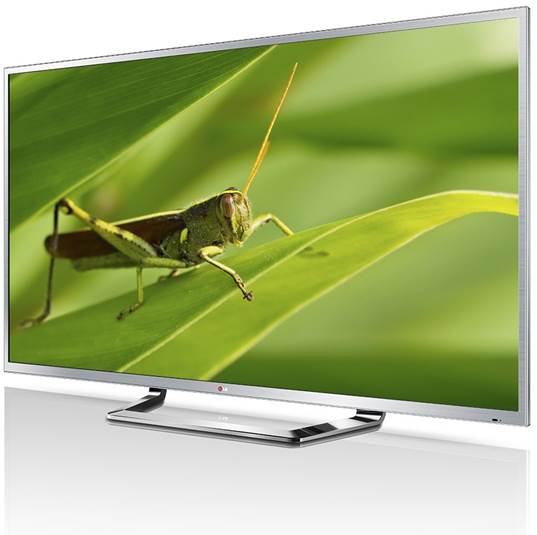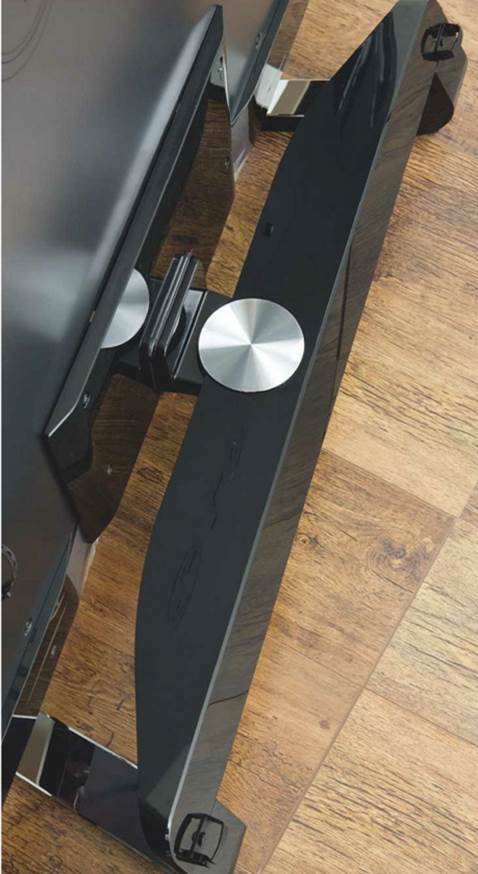LG’s flagship 84in screen is both
super-large and, thanks to its Ultra HD resolution, state-of-the-art in terms
of technology. How much does it cost? Well, if you need to ask…
The humble television is changing. As if
touched up by a troupe of Kubrick monkeys, yesterday’s Full HD TV is now on
course for a revolutionary image upgrade to 4K Ultra high-definition, an
evolution fuelled by advances in panel production, the development of new
compression codec technology and a crying need to inject life into the moribund
global TV market. Frankly, we couldn’t be more excited.

LG
84LM960V
4K Ultra HD was the star attraction at this
year’s International CES in Las Vegas, with every TV major dealing some form of
high-resolution hand, and while native content remains a conundrum, there seems
little doubt that industry-wide commitment is real. Of all the brands touting
4K, it’s LG which appears to have the most to shout about. Its panel-making
division, LG Display, is already the primary supplier of glass for most TV
manufacturers and it remains the only outfit currently shipping UHD screens in
volume, already shoehorning this massive 4K debutante into multiple stores
across the land. Admittedly, it may be some time before you see them in the
aisles of your local supermarket, but it’s not going to be too difficult to
locate a supplier. John Lewis, Bentalls and Richer Sounds (to name but three)
have all signed up.
Not that Ultra HD will suit everyone. As a
fledgling TV technology, it’s frighteningly expensive and this 84in screen may
seem a little challenging to accommodate, but any tech promising four times the
clarity of Full HD isn’t going to come cheap and needs a really large display
to be fully appreciated. That said, LG is planning to introduce smaller sets
(65in/55in) at lower prices later this year. But that is next, this is now…
Big daddy display
There’s no getting away from it, the
84LM960V is a phenomenal-looking beast with an immaculate finish. LG hasn’t
skimped on build quality. Despite what seems like an acre of metal and glass,
it’s relatively thin at 40mm, but a naked weight approaching 70kg will make you
think twice about wall-mounting. The supplied metallic stand offers stylish
curves and is easy to manage, but can prove distractingly mirrored,
particularly when credits are scrolling above it.
The set’s sound system is fully integrated,
unlike Sony’s rival 4K TV which hangs high-end speakers off the frame almost as
an optional extra. Purely from an aesthetic viewpoint, the result is more
harmonious, offering clear lines.

While
we wait for native 4K content, LG's screen up-scales Blu-rays with panache
Connectivity is par for the high-end
course: there’s are four HDMIs, component and Scart via adaptor, PC Ethernet
and a trio of USBs, one of which handles time shift duties to an external
drive. Wi-Fi is built-in for those unable to hardwire Ethernet and there’s Wi-Di
and a Wi-Fi Share direct mode, which enables compatible mobile devices to be
connected directly without burdening your home network.
Two remote zappers are included in the box,
a standard LG IR control (which seems inappropriately ordinary considering the
cost of this screen) plus the brand’s wave-it-all-about Magic Remote wand.
The screen comes with a pack of four
Passive 3D glasses, plus a pair of clip-ons for attaching to your prescription
spectacles. As with LG’s regular Full HD TVs, the 84LM960V offers passively
polarized FPR (Film Patterned Retarder) 3D. Also included are two Dual Play
goggles which enable simultaneous split-screen gaming. This actually works
rather well. While there is some image ghosting between the two alternate
views, the resulting images are clean enough for general gameplay.
Two tuners are on board: one for Freeview
HD, the other for DVB-S2 satellite reception. Although intended primarily for
European use, there’s no reason why you couldn’t hook up a spare Sky dish if
you have problems getting a decent terrestrial signal. This will give alternative
access to the Freesat channel bouquet, albeit without the navigational niceties
of the Freesat EPG environment.
Making space for Ultra high-definition
As the below illustration shows, the
overall size difference between an 84in screen and a 55in model is considerable
(and a 32in TV appears tiny in comparison). However, our experience shows that
you soon adjust to super-size screes, and what seems massive at first quickly
becomes normal. And don't forget that LG is planning to release smaller (and more
affordable) UHD sets in the Autumn.

Making
space for Ultra high-definition
Feature attractions
In addition to 3D, the 84LM960V also offers
network streaming functionality and access to LG’s now mature Smart TV portal.
This means there’s a range of premium streaming services available, including
BBC iPlayer, Netflix, Lovefilm and YouTube. The latter offers some 4K-labelled
content, but while it looks nice enough, it simple doesn’t compare with
full-fat4K delivered at upwards of 40Mbps. However, the set’s 4K Resolution+ up-scaler
doesn’t do too bad a job with HD catch-up steams.
The TV is DLNA compliant, with media
playback facilities on a par with other premium LG Smart TVs. File
compatibility covers MKV, AVI, MOV and MP4 codecs, while a Smart Share mode
allows you to make the set discoverable to LG devices running the Smart Share
app.
The user interface itself is somewhat
disappointing, though. Rather than produce an Ultra-optimized GUI, LG has
simply loaded up its stock UI. On a set of this size it means the menus and
text appear absolutely massive and not entirely sharp. How much nicer it would
have been to get an Ultra HD remix of the interface. Hopefully LG will think
hard about addressing this on its upcoming second-generation UHD models. It
just doesn’t do for a state-of-the-art panel like this to present a fuzzy face
to the world.
One ongoing problem facing any 4K panel
proposition is the complete lack of commercial native 4K content to play on it.
To get around that not inconsiderable hurdle, we evaluated this big LG with a
UHD media server pre-loaded with 2D and 3D 4K test footage. An assortment of
time lapse photography and CG animations may not give Sky Movies anything to
worry about, but it says much that in Ultra HD this rather uninspiring collection
transpired to be totally mesmerizing. The level of absolute fine detail the
screen can resolve is quite extraordinary. You can literally peer deep into an
image, finding nuance and texture where previously there would only be a
glowing pixel grid. It’s like looking through an impossibly clean, pin-sharp
window.
Thankfully, the 84LM960V quadruples regular
Full HD resolution material with equal aplomb. BBC HD, remapped to 3,840 x
2,160, is gloriously, cinematically smooth. Upscaled Rastamouse is a riot of
color, with immaculate detail in the rodent fur. With no pixel structure
evident, this oversized animation looked extraordinary. The BBC’s Africa
documentary series is exponentially more impressive. Frankly it looked better
than being there.

As
you'd hope with a $33,750 TV, the stand is reassuringly study
It’s astonishing just how quickly you
adjust to a screen of this size. The extra resolution translates to zero
viewing fatigue, it’s all wonderfully comfortable. Of course, one consequence
of running a mega display is that you tent to avoid standard-definition content
altogether. This isn’t the hardship that it might once have been, particularly
if you subscribe to a premium pay service from Sky or Virgin Media.
The panel does its best up-scaling work
with Blu-ray. Marvel’s Avengers Assemble, a good-looking 1080p disc, takes on a
vibrant density when up-scaled that look remarkably like a theatrical
presentation. The premiere super group is even more formidable in Ultra HD.